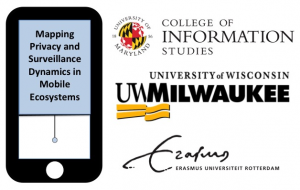 Project Website: mobileprivacy.umd.edu
Project Website: mobileprivacy.umd.edu
This project, titled “Mapping Privacy and Surveillance Dynamics in Emerging Mobile Ecosystems: Practices and Contexts in the Netherlands and US,” is a collaboration between Jessica Vitak at UMD, Michael Zimmer at UW-Milwaukee, and Jason Pridmore & Dan Trottier at Erasmus University. It was awarded funding by the NSF (US) and NWO (Netherlands) in September 2016 for a three-year project. More info from on the grant can be found here.
The increasing ubiquity of mobile technologies creates unique privacy and surveillance challenges for users. These problems are global, but the way users, organizations, and governments approach these challenges varies based on cultural norms around privacy. This cross-cultural project evaluates how mobile users in the U.S. and the Netherlands think about and make decisions about their privacy when using mobile apps. The project’s primary goal is to inform both ways of thinking about privacy in the digital age and practical implementations that pertain to the digital self, with an emphasis on tensions between privacy, disclosure, mobility and surveillance. Furthermore, this study highlights privacy practices across different legal and cultural frameworks, providing important implications for broad-based policy decisions.
In collaboration with researchers at Erasmus University in the Netherlands, this project has three phases. Phase 1 develops a preliminary understanding of privacy awareness and practices across three emerging mobile ecosystems: health and fitness tracking (e.g., Fitbit), mobile messaging apps (e.g., Whatsapp), and intelligent digital personal assistants (e.g., Siri). Building on these findings, Phase 2 involves cross-cultural data collection and analysis using privacy vignettes, which allows for identification and comparison of individuals’ privacy norms across contexts and cultures. Phase 3 focuses on dissemination of findings to key stakeholders and policymakers, and building an international working group of researchers active in this space. The focus on unpacking how privacy is conceptualized and implemented across two countries with very different cultural conceptions of privacy expands our understanding of the contextual nature of mobile privacy “enabling an extension of Helen Nissenbaum’s work on privacy as contextual integrity” while also providing practical implications for researchers and designers employing a Privacy by Design framework.